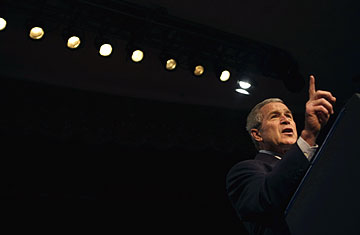
President George W. Bush speaks at a luncheon for Republican lawmakers in White Sulphur Springs, West Virginia, Friday, Jan. 25, 2008
This year's State of the Union address should be called the State of the Legacy address. George W. Bush enters his last year as President unpopular, politically weak and with his place in history largely dependent on the unpredictable future of Iraq. But Bush believes his revamped staff and newly centrist foreign policy can broaden the view of his presidency and reframe him as an agent for freedom at home and abroad. Beneath Bush's modest proposals and lofty rhetoric Monday evening, the subtext will be simple: history will vindicate me.
The theme of the speech is, "Trusting and empowering people to make decisions for themselves," says White House spokesperson Dana Perino. Bush first brought the idea of a grand summation of his presidency to his speechwriters last April, she says, and they began working on it in December as a way of carrying his last to-do list in the State of the Union speech. The theme is intended to unite Bush's domestic agenda items (making his tax breaks permanent and boosting the economy) with foreign priorities (pursuing the war in Iraq, peacemaking and boosting foreign aid) under the banner of liberty.
Outside the White House, few care much about Bush's legacy these days, no matter how it's packaged. Democrats and Republicans are paying attention to the speech only for whether it affects their electoral races. House Speaker Nancy Pelosi's "pre-buttal" Friday didn't even mention Bush by name, while Senate majority leader Harry Reid's spokesman Jim Manley says the speech is "just a sideshow" that "helps to highlight how irrelevant the President is."
Republicans like the timing of the speech. Bush will beat up on Democrats over stalled domestic eavesdropping legislation and tout a bipartisan stimulus package he helped negotiate — both issues are vote winners for G.O.P. candidates. Beyond that, they're happy if he catches a few spears for them. Says one senior G.O.P. Hill aide: "If [the Democrats]want to spend resources attacking a President who won't be on the ballot, great." Neither party on the Hill expects Bush to have a big impact before he leaves office.
However stillborn Bush's final agenda may be, though, he does have reason to hope for a ratings boost over the next 12 months. Even unpopular Presidents often leave on an upswing, thanks to the end-of-term focus on statesmanship and because they look good next to those scrambling to replace them. Bush has pretty much nowhere to go but up from his current 34% in the polls. The war is improving and it looks as if there will be a steady drawdown of troops over the next 12 months. And even if his diplomatic initiatives, like the Arab-Israeli peace effort, don't bear fruit, he'll get some points for trying.
But it will be an uphill push. The economy is headed for recession, fuel prices are high and the mortgage crisis is affecting a broad swath of the country. The improvement in Iraq may win some supporters back, but the war remains unpopular. And to the extent they take time to think about it, most people have made up their minds about George W. Bush's presidency at this point. Even wrapped in the cloak of "liberty," the most Bush can hope for this year is a modest bounce. As for the history books, nothing he puts on the table Monday evening will change that judgment.
